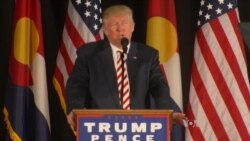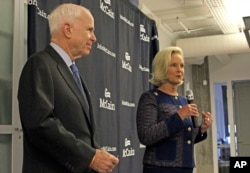While controversies surrounding Donald Trump loom large in the presidential race, the Republican nominee is also a focus of legislative contests that will determine which political party controls Congress.
Trump’s candidacy dominated the first five minutes of Monday’s debate between Republican Senator Pat Toomey of Pennsylvania and his Democratic challenger, Katie McGuinty – a contest both political parties desperately want to win.
Asked whether they back their respective parties’ presidential candidates, McGuinty affirmed that she supports Democrat Hillary Clinton.
Toomey indicated he remains on the fence regarding Trump.
“I have not reached a point where I can endorse Donald Trump,” Toomey said. “We have two badly flawed [presidential] candidates.”
McGuinty then criticized Toomey for not ruling out endorsing “a guy who has bragged about sexual assault.”
The exchange illustrated a primary Democratic line of attack nationwide: tying Republican lawmakers to their party’s nominee.
Republicans have responded in a variety of ways.
John McCain of Arizona was one of several Senate Republicans who rescinded his endorsement of Trump after video from 2005 was released in which the business mogul spoke of groping women.
Others, like John Thune of South Dakota, joined McCain in unendorsing Trump, only to reverse course days later and say that he intended to support the nominee.
In Florida, Senator Marco Rubio stood by his endorsement of Trump, arguing Democrat Hillary Clinton is worse.
“I don’t trust Hillary Clinton with classified information,” Rubio said. “She has proven she cannot handle it.”
Republican strategists say their party’s congressional candidates are in a bind.
“The biggest problem for a lot of these Republicans is their base supporters, the ones who are going to come out and vote; they are still supporting Donald Trump,” said Washington-based Republican consultant John Feehery.
“A lot of these members are thinking, ‘How do I win?’ And if it helps them to condemn Trump in swing districts, they are going to do that. If it’s better for them to be quiet, they’re going to do that. And if it’s better to support Trump, they’re going to do that,” Feehery added.
After eight years of Democratic control, Republicans won a slim Senate majority in 2014. Democrats would need to gain four seats to recapture the majority if Clinton wins, five seats if Trump is elected.
“I think we will win a majority in the Senate,” said Democrat Chuck Schumer of New York. “The Republican Party is in shambles and their candidates – incumbent senators – can’t decide what to do with Trump.”
This year’s political terrain would seem ideal for Senate Democrats. Republicans are defending more than twice as many seats as Democrats, including several in Democratic-leaning states.
Republican Majority Leader Mitch McConnell of Kentucky doesn’t underestimate the challenge his caucus faces.
“Sort of like a knife fight in a phone booth,” McConnell said. “It could go either way.”
But polls don’t show a Republican wipeout in the making. The party’s most senior senators are comfortably ahead in their re-election bids. Many others trail their Democratic challengers by only a few points.
Rubio is among those leading in the polls, telling Floridians his voice is needed as a counterweight to a possible Clinton presidency.
“No matter who wins this election, you are going to need people in the U.S. Senate willing to stand up to the next president of the United States,” Rubio said.
Even so, Feehery concedes that Trump could cost Republicans seats in both houses of Congress – the only question is how many.
“If Donald Trump loses the election by 10 points, the House [[of Representatives]] is in danger. The Senate is going to be a toss-up anyway,” Feehery said.






